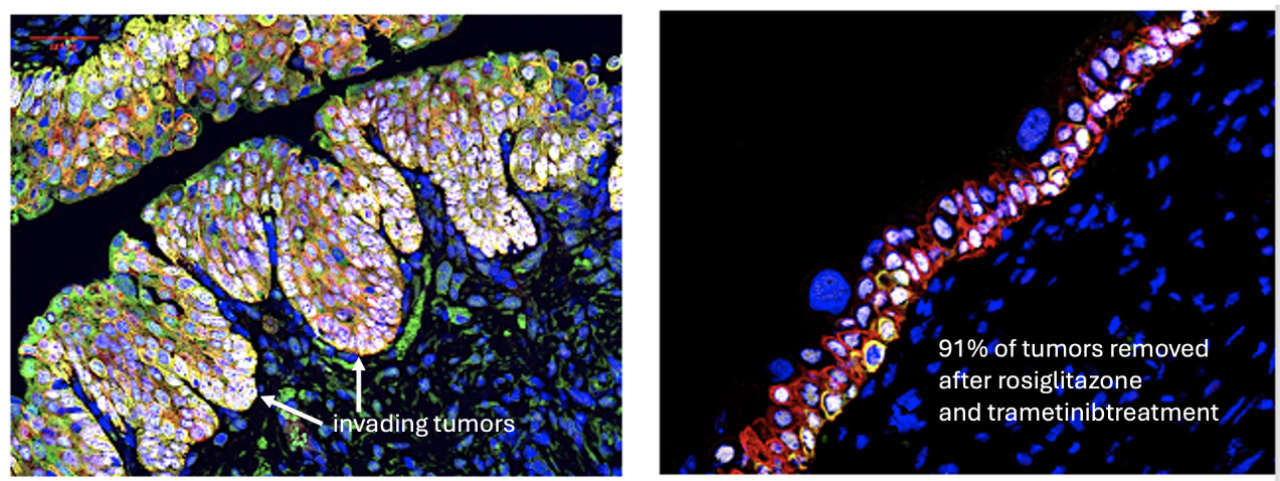
Cathy Lee Mendelsohn, PhD
A new study in mice by researchers at the Herbert Irving Comprehensive Cancer Center (HICCC) has identified a promising drug combination for the treatment of muscle-invasive bladder cancer. Rosiglitazone plus trametinib worked synergistically to not only induce tumor cell death, but also shift aggressive tumor cells to a more benign molecular subtype.
The research team, led by Cathy Lee Mendelsohn, PhD, a member of the HICCC, is hopeful about advancing to clinical trials to evaluate the efficacy of this combination therapy in human patients. The study was published by Nature Communications.
Meeting an urgent demand in bladder cancer treatments
"Despite recent advances, cystectomy is still the main treatment for patients with muscle invasive bladder cancer," says Mendelsohn, professor of urological sciences (in urology) and pathology & cell biology and genetics & development (in the Institute of Human Nutrition) at Columbia University. "More recently, we have the approval of checkpoint inhibitors - but they only work on a percentage of tumors. We just need more avenues for treatment."
Bladder cancer is the sixth most common form of cancer in the United States, with more than 83,000 new cases and 16,800 deaths per year. Most bladder cancers are non-muscle-invasive, meaning they have not yet reached the muscle wall of the bladder, and have a good prognosis. However, up to 20% of non-muscle-invasive bladder cancers can progress to muscle-invasive bladder cancer, which has a five-year overall survival rate of approximately 50%. While metastatic progression is not common, it is almost always fatal.
Since the early 2000s, standard treatment for muscle-invasive bladder cancer has been neoadjuvant chemotherapy followed by surgery, sometimes with the addition of radiation therapy. In the last several years, several immune checkpoint inhibitors, which work by releasing a natural brake on the body's immune T cells, have been approved by the U.S. Food and Drug Administration (FDA). These immunotherapy drugs offer some patients another option - about 20% of those with advanced and metastatic disease will benefit - but response rates are still too low.
A new therapy to annihilate, then ameliorate, tumors
Mendelsohn and her colleagues decided to take a different approach, using a drug combination that has shown potential for breast cancer. Studies in mice have demonstrated that rosiglitazone plus trametinib prevents both tumor growth and metastasis, turning invasive breast cancer cells into fat cells. Rosiglitazone activates PPARG, a transcription factor that activates such trans-differentiation, and trametinib boosts PPARG signaling in the tumor.
"If you give the two drugs together for a month, you induce apoptosis... then whatever's left of the tumor shifts... to the luminal phenotype." - Dr. Mendelsohn
Instead of going from tumor cells to fat cells, in muscle-invasive bladder cancer, the combination therapy converted tumor cells to a more benign subtype. As opposed to basal/squamous tumors, luminal tumors generally have a better prognosis and may respond more favorably to certain treatments.
"In bladder cancer, there are two molecular subtypes. Luminal tumors grow into the bladder lumen, and they're relatively benign," says Mendelsohn. "But basal/squamous tumors grow into the muscle and can metastasize, so these are much more dangerous."
The researchers employed autochthonous mouse models of muscle-invasive bladder cancer, meaning that the tumors evolve out of normal cells within a living organism. As opposed to transplanted tumors, autochthonous mouse models replicate the natural course of tumor progression, from tumor initiation to metastasis. In mice treated with rosiglitazone plus trametinib, tumors decreased in size by an average of 91%, and in most cases, residual tumors were not detectable.

Tumors in a section of untreated muscle invasive bladder cancer (left) vs. section treated with Rosiglitazone and Trametinib showing 91% fewer tumors (right).
"When we give the animals rosiglitazone or tremetinib alone, you slow the growth of the tumors, but you don't get rid of them," she says. "But if you give the two drugs together for a month, you induce apoptosis after about a week, and then whatever's left of the tumor shifts from the basal/squamous phenotype to the luminal phenotype."
The results suggest that these therapies - which are both FDA-approved, rosiglitazone for type 2 diabetes and tremetinib for cancers including melanoma, non-small cell lung cancer, and thyroid cancer - should be further investigated for treatment of patients with basal/squamous muscle-invasive bladder cancer.
"We would have to adjust the doses and figure out what's the minimum time we can treat in humans," says Mendelsohn. "But ultimately, I'm hoping that we can adapt this combination therapy to some sort of a clinical trial in the near future."






